GRE
- 格式:doc
- 大小:87.50 KB
- 文档页数:22
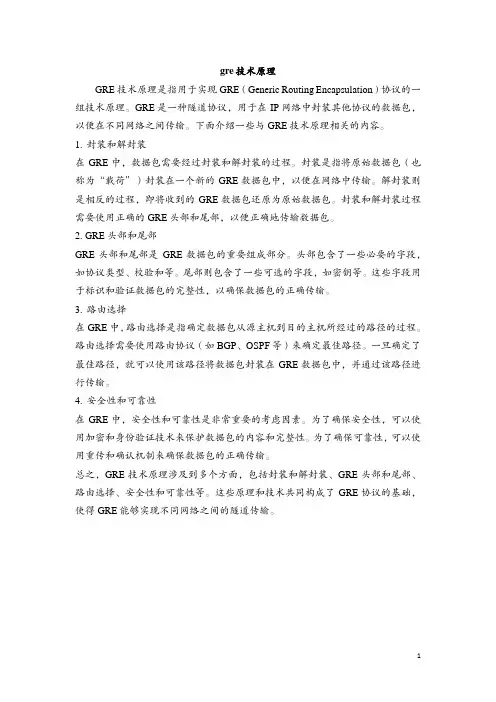
gre技术原理GRE技术原理是指用于实现GRE(Generic Routing Encapsulation)协议的一组技术原理。
GRE是一种隧道协议,用于在IP网络中封装其他协议的数据包,以便在不同网络之间传输。
下面介绍一些与GRE技术原理相关的内容。
1. 封装和解封装在GRE中,数据包需要经过封装和解封装的过程。
封装是指将原始数据包(也称为“载荷”)封装在一个新的GRE数据包中,以便在网络中传输。
解封装则是相反的过程,即将收到的GRE数据包还原为原始数据包。
封装和解封装过程需要使用正确的GRE头部和尾部,以便正确地传输数据包。
2. GRE头部和尾部GRE头部和尾部是GRE数据包的重要组成部分。
头部包含了一些必要的字段,如协议类型、校验和等。
尾部则包含了一些可选的字段,如密钥等。
这些字段用于标识和验证数据包的完整性,以确保数据包的正确传输。
3. 路由选择在GRE中,路由选择是指确定数据包从源主机到目的主机所经过的路径的过程。
路由选择需要使用路由协议(如BGP、OSPF等)来确定最佳路径。
一旦确定了最佳路径,就可以使用该路径将数据包封装在GRE数据包中,并通过该路径进行传输。
4. 安全性和可靠性在GRE中,安全性和可靠性是非常重要的考虑因素。
为了确保安全性,可以使用加密和身份验证技术来保护数据包的内容和完整性。
为了确保可靠性,可以使用重传和确认机制来确保数据包的正确传输。
总之,GRE技术原理涉及到多个方面,包括封装和解封装、GRE头部和尾部、路由选择、安全性和可靠性等。
这些原理和技术共同构成了GRE协议的基础,使得GRE能够实现不同网络之间的隧道传输。
1。
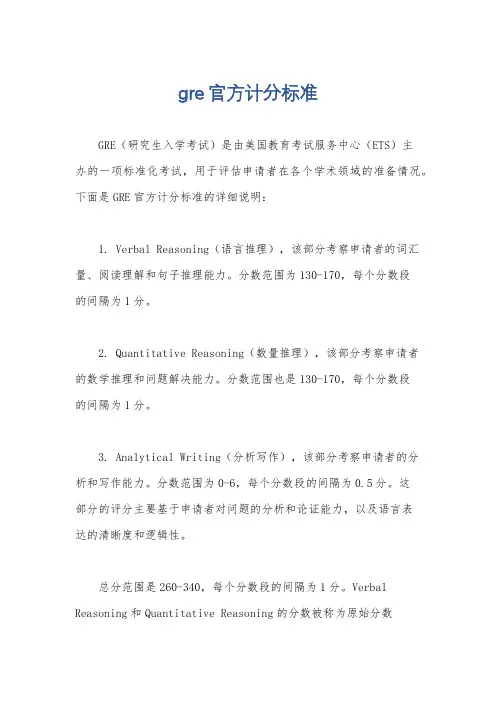
gre官方计分标准GRE(研究生入学考试)是由美国教育考试服务中心(ETS)主办的一项标准化考试,用于评估申请者在各个学术领域的准备情况。
下面是GRE官方计分标准的详细说明:1. Verbal Reasoning(语言推理),该部分考察申请者的词汇量、阅读理解和句子推理能力。
分数范围为130-170,每个分数段的间隔为1分。
2. Quantitative Reasoning(数量推理),该部分考察申请者的数学推理和问题解决能力。
分数范围也是130-170,每个分数段的间隔为1分。
3. Analytical Writing(分析写作),该部分考察申请者的分析和写作能力。
分数范围为0-6,每个分数段的间隔为0.5分。
这部分的评分主要基于申请者对问题的分析和论证能力,以及语言表达的清晰度和逻辑性。
总分范围是260-340,每个分数段的间隔为1分。
Verbal Reasoning和Quantitative Reasoning的分数被称为原始分数(Raw Score),而Analytical Writing的分数则是经过评分官评估后的得分。
此外,ETS还提供了一个百分比排名(Percentile Rank)的概念,它表示一个考生在所有参加GRE考试的人群中所处的百分比位置。
例如,如果一个考生的百分位排名是80%,那么他/她的得分超过了80%的考生。
需要注意的是,不同学校和专业对GRE的要求不同,有些学校可能更注重某个分数段,或者要求申请者在某个部分达到一定的分数要求。
因此,申请者在准备GRE时应该根据目标学校和专业的要求来制定合适的备考策略。
以上是关于GRE官方计分标准的全面解释,希望对你有所帮助。

GRE考试内容介绍-GRE考试各部分组成GRE主要是视察考生的基本〔英语〕能力以及对英语各方面知识的深度和广度的掌握,其考试内容分为三个部分:分析性写作部分、词汇(Verbal)部分和数学(Quantitative)部分。
GRE的一般能力考试(General Test)主要是视察考生的基本英语能力以及对英语各方面知识的深度和广度的掌握。
它包括三部分:第一部分为分析性写作部分(Analytical Writing),包括两个任务,分别要求应试者对一个问题发表个人的观点(Issue Task)和分析一个论点(Argument Task),写作部分满分为6分,一般能够达到4.5就非常优秀了。
第二部分为词汇(Verbal)部分,该部分内容很广泛,涉及天文、地理、人文、科学、艺术、政治及历史等领域。
第三部分为数学(Quantitative)部分,该部分皆为数理上的基本问题,包括几何、代数、统计图表、智力测验等方面,主要目的在于测验考生基本数学的潜在能力和对数理方面问题的理解推断及推理反应能力。
题目难易和深浅程度,有时取决于考生关于题目表达与说明的理解。
2GRE考试各部分组成1、分析性写作分析性写作分为两部分:一为观点题(issue),内容通常是关于社会、科学、历史、哲学、政治等方面的观点进行评论;二为回应题(argument),内容通常是对给定情景中推理的驳斥。
写作部分总分为两部分分数的平均值,分数间差异的最小单位为0.5分。
假设文章被判为雷同,ETS将取消考生考试成绩。
分析性写作两项独立计时,Issue与Argument 每项任务30分钟,写作部分将重点视察考生有针对性地对具体考题做出反应的能力,而非要求考生堆砌泛泛的文字。
具体说来,这些重点关注的能力包括:清楚有效地阐明复杂观点,用贴切的事理和事例支撑观点,视察/验证他人论点及其相关论证,支撑一个有针对性的连贯的讨论,控制标准书面英语的各个要素。
2、语文语文共分为两部分,每部分约20题,每部分时长30分钟。
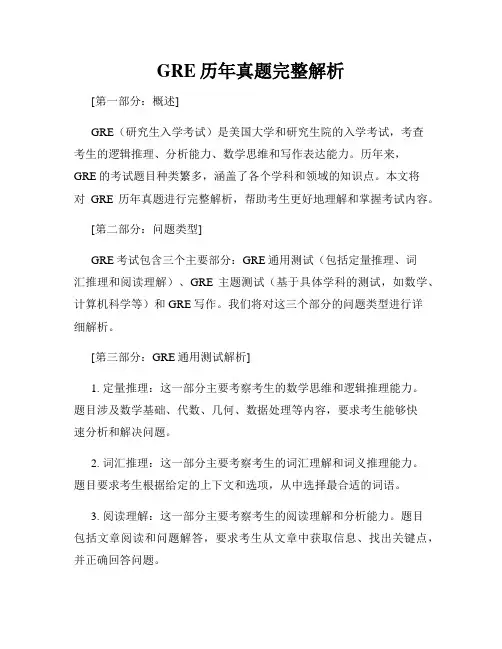
GRE历年真题完整解析[第一部分:概述]GRE(研究生入学考试)是美国大学和研究生院的入学考试,考查考生的逻辑推理、分析能力、数学思维和写作表达能力。
历年来,GRE的考试题目种类繁多,涵盖了各个学科和领域的知识点。
本文将对GRE历年真题进行完整解析,帮助考生更好地理解和掌握考试内容。
[第二部分:问题类型]GRE考试包含三个主要部分:GRE通用测试(包括定量推理、词汇推理和阅读理解)、GRE主题测试(基于具体学科的测试,如数学、计算机科学等)和GRE写作。
我们将对这三个部分的问题类型进行详细解析。
[第三部分:GRE通用测试解析]1. 定量推理:这一部分主要考察考生的数学思维和逻辑推理能力。
题目涉及数学基础、代数、几何、数据处理等内容,要求考生能够快速分析和解决问题。
2. 词汇推理:这一部分主要考察考生的词汇理解和词义推理能力。
题目要求考生根据给定的上下文和选项,从中选择最合适的词语。
3. 阅读理解:这一部分主要考察考生的阅读理解和分析能力。
题目包括文章阅读和问题解答,要求考生从文章中获取信息、找出关键点,并正确回答问题。
[第四部分:GRE主题测试解析]GRE的主题测试根据学科分类,包括数学、物理、化学、计算机科学等。
本文将以数学为例进行解析。
1. 数学:GRE数学部分涉及代数、几何、概率与统计等内容。
题目要求考生运用数学方法解决问题,如解方程、计算几何等。
[第五部分:GRE写作解析]GRE写作部分共有两个作文题目,一个Argument写作,一个Issue写作。
我们将对这两个题目进行详细解析。
1. Argument写作:这一部分要求考生对给定的观点进行分析和批判。
考生需要评估给出的论据和推理过程,提出自己的观点,并给予支撑。
2. Issue写作:这一部分要求考生从给定的议题中选择一个立场,进行陈述和论证。
考生需要表达清晰的观点,并给出充分的理由和例证支持。
[第六部分:备考建议]在备考GRE历年真题时,考生需注重以下几点:1. 熟悉各类题型:了解并熟悉各类题型的出题方式和解题思路,掌握相应的解题技巧和方法。

gre 90%分位数GER(德国语言考试)是评估非德语母语者在德语听、说、读、写四个方面能力的标准化考试。
它被德国大学和其他德语授课的高等教育机构作为入学或入学后的语言要求。
了解GER考试的90%分位数对于备考和提高成绩具有重要意义。
首先,让我们了解一下90%分位数。
在统计学中,90%分位数表示一组数据中有90%的数据小于或等于它,而有10%的数据大于它。
在GER考试中,90%分位数意味着成绩达到或超过这个分数的学生只有10%不到。
换句话说,如果你想在这个考试中脱颖而出,你需要努力达到这个分数。
那么,如何提高GER成绩并迈向90%分位数呢?以下是一些建议:1.制定合理的备考计划:根据自己的实际情况,合理安排学习时间,确保在考试前系统地完成听、说、读、写四个方面的训练。
2.注重基础知识:扎实的德语语法和词汇是提高成绩的关键。
通过学习语法规则和积累词汇,不断提高自己的语言基础。
3.大量练习:通过模拟考试和做题,熟悉考试题型,提高答题速度和准确性。
同时,分析自己的错误,找出问题所在,针对性地进行改进。
4.注重口语训练:与母语为德语的人交流,提高口语表达能力。
此外,可以参加口语课程或请教老师,获取专业的指导和建议。
5.提高阅读速度:阅读是GER考试中一个重要的部分。
通过阅读德语文章、新闻和书籍,提高阅读速度和理解能力。
6.定期总结和反思:在备考过程中,定期对自己的学习进行总结和反思,找出不足之处,及时调整学习方法和计划。
针对90%分位数的备考策略,可以采取以下措施:1.设定目标:为自己设定一个具体的目标分数,明确努力方向。
2.分析优秀范文:研究高分作文的特点,学习他们的写作技巧和表达方式。
3.加强专项训练:针对自己的薄弱环节,进行有针对性的训练。
4.模拟考试:模拟真实考试环境,熟悉考试流程,提高应试能力。
总之,要想在GER考试中取得优异成绩,需要扎实的基础、科学的备考方法和持续的努力。
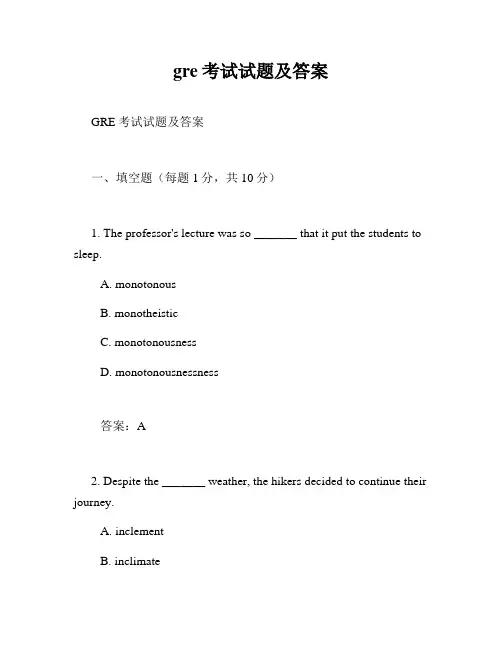
gre考试试题及答案GRE考试试题及答案一、填空题(每题1分,共10分)1. The professor's lecture was so _______ that it put the students to sleep.A. monotonousB. monotheisticC. monotonousnessD. monotonousnessness答案:A2. Despite the _______ weather, the hikers decided to continue their journey.A. inclementB. inclimateD. inclimateness答案:A3. The _______ of the novel lies in its ability to capture the essence of the human condition.A. pertinenceB. pertinencyC. pertinencynessD. pertinenceness答案:B4. The _______ of the evidence made it impossible to prove the defendant's guilt.A. ambiguousB. ambiguitiesC. ambiguousness答案:B5. The _______ of the new policy was met with mixed reactions from the public.A. implementationB. implementC. implementnessD. implementationness答案:A6. The _______ of the ancient city can be traced back to the 5th century BC.A. originB. originalC. originalnessD. originness答案:A7. The _______ of the painting is often debated among art historians.A. authenticityB. authenticC. authenticnessD. authenticityness答案:A8. The _______ of the speech was clear, but the content was difficult to understand.A. articulationB. articulateC. articulatenessD. articulationness答案:A9. The _______ of the experiment was carefully controlled to ensure accurate results.A. variablesB. variableC. variablesnessD. variableness答案:A10. The _______ of the poem is often considered to be its most striking feature.A. imageryB. imagineC. imaginenessD. imageryness答案:A二、阅读理解题(每题2分,共20分)阅读以下短文,然后回答问题。
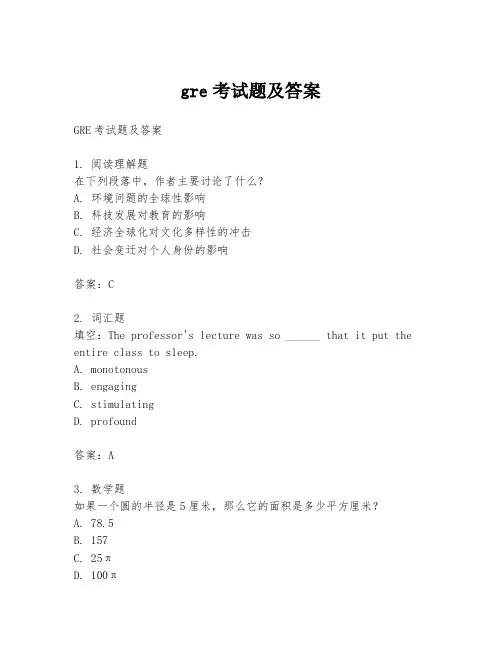
gre考试题及答案GRE考试题及答案1. 阅读理解题在下列段落中,作者主要讨论了什么?A. 环境问题的全球性影响B. 科技发展对教育的影响C. 经济全球化对文化多样性的冲击D. 社会变迁对个人身份的影响答案:C2. 词汇题填空:The professor's lecture was so ______ that it put the entire class to sleep.A. monotonousB. engagingC. stimulatingD. profound答案:A3. 数学题如果一个圆的半径是5厘米,那么它的面积是多少平方厘米?A. 78.5B. 157C. 25πD. 100π答案:D4. 反义词题找出“elaborate”的反义词。
A. vagueB. complexC. simpleD. detailed答案:A5. 逻辑推理题所有参加GRE考试的学生都需要通过英语水平测试。
如果一个学生没有通过英语水平测试,那么他/她就不能参加GRE考试。
根据上述信息,以下哪项陈述是正确的?A. 所有通过英语水平测试的学生都能参加GRE考试。
B. 没有通过英语水平测试的学生都不能参加GRE考试。
C. 只有通过英语水平测试的学生才能参加GRE考试。
D. 所有GRE考试的学生都必须参加英语水平测试。
答案:C6. 句子等价题Which of the following is equivalent to the statement "Notall students who study hard pass the exam"?A. All students who study hard pass the exam.B. Some students who study hard pass the exam.C. No students who study hard pass the exam.D. Some students who study hard do not pass the exam.答案:D7. 写作题请以“科技对现代教育的影响”为题,写一篇不少于300字的短文。

gre考试试题及答案GRE考试试题及答案一、填空题(每题1分,共10分)1. The professor's lecture was _______; it was both informative and engaging.A. monotonousB. tediousC. rivetingD. dull答案:C2. Despite the evidence, the defendant continued to maintain his_______.A. innocenceB. guiltC. neutralityD. bias答案:A3. The novel's plot is _______, with numerous twists and turns that keep the reader guessing.A. predictableB. linearC. convolutedD. straightforward答案:C4. The company's new policy has been met with _______ from its employees.A. enthusiasmB. skepticismC. indifferenceD. apathy答案:B5. The artist's work is characterized by a _______ use of color, which sets it apart from others.A. sparingB. lavishC. frugalD. restrained答案:B6. The politician's speech was _______ with anecdotes and personal stories to connect with the audience.A. pepperedB. saturatedC. inundatedD. permeated答案:A7. The scientist's research was _______, as it challenged the prevailing theories in the field.A. groundbreakingB. derivativeC. redundantD. conventional答案:A8. The movie's ending was _______, leaving the audience with a sense of closure.A. ambiguousB. conclusiveC. abruptD. unresolved答案:B9. The historian's analysis of the event was _______, providing a comprehensive view of the situation.A. superficialB. cursoryC. in-depthD. shallow答案:C10. The debate was _______, with both sides presenting strong arguments and counterarguments.A. one-sidedB. balancedC. lopsidedD. uneven答案:B二、阅读理解(每题2分,共20分)Passage 1In recent years, there has been a significant increase in the popularity of electric vehicles (EVs). This trend can be attributed to several factors, including environmental concerns, technological advancements, and government incentives. However, the widespread adoption of EVs is not without its challenges. One of the primary issues is the lack of charging infrastructure, which can limit the range and convenience of EVs for consumers.Questions:11. What is the main reason for the increase in popularity of electric vehicles?A. Environmental concernsB. Technological advancementsC. Government incentivesD. All of the above答案:D12. What is one of the challenges faced by the widespread adoption of electric vehicles?A. High costB. Lack of charging infrastructureC. Limited rangeD. Slow charging times答案:BPassage 2The concept of artificial intelligence (AI) has been a topic of interest for decades. While early AI systems were limited in their capabilities, recent advancements have led to the development of more sophisticated and versatile AI technologies. These advancements have the potential to revolutionize various industries, including healthcare, finance, and transportation. However, the ethical implications of AI must also be considered, as the technology can have both positive and negative consequences.Questions:13. What has been the impact of recent advancements in AI technology?A. Limited capabilitiesB. Revolutionized industriesC. Ethical concernsD. Both B and C答案:D14. Which industries are mentioned as being potentially revolutionized by AI technology?A. Healthcare and financeB. Finance and transportationC. Healthcare and transportationD. All of the above答案:C三、数学问题(每题3分,共15分)15. If the sum of two numbers is 10 and their product is 20, what are the two numbers?A. 2 and 8B. 4 and 6C. 5 and 5D. None of the above答案:A16. What is the value of x in the equation 3x - 7 = 8?A. 5B. 3C. 7D. 9答案:A17. If a rectangle has a length of 12 units and a width of 8 units, what is its area?A. 96 square unitsB. 64 square unitsC. 48 square unitsD. 32 square units答案:B18. The sum of the first 10 positive integers is 55. What is the sum of the first 15 positive integers?A. 120B. 105C. 85D. 75答案:A19. If a car travels at a constant speed of 60 miles per hour, how long will it take to travel 180 miles?A. 3 hoursB. 2 hoursC. 1.5 hoursD. 1 hour答案:A四、逻辑推理(每题4分,共20分)20. All students who are members of the debate team are eloquent speakers. If a person is not a member of the debate team, then they are not an eloquent speaker. Which of the following can be concluded from this information?A. All eloquent speakers are members of the debate team.B. No eloquent speaker is a member of the debate team.C. Some eloquent speakers are not members of the debate team.D. None of the above.答案:D21. If it rains, then the game will be canceled. If the game is not canceled, then it did not rain. Which of the following can be concluded from this information?A. If it did not rain, then the game will not be canceled.B. If it rained, then the game was canceled.C. If the game was not canceled, then it rained.D. None of the above.答案:A22. All cats are mammals. Some mammals are not cats. Which of the following can be concluded from this information?A. All mammals are cats.B. No mammals are cats.C. Some mammals are cats.D. None of the above.答案:C23. If a person is a vegetarian, then they do not eat meat. If a person does not eat meat, then they are a vegetarian. Which of the following can be concluded from this information?A. All vegetarians eat meat.B. No vegetarians eat meat.C. Some vegetarians eat meat.D. None of the above.答案:B24. If a book is a bestseller, then it has sold more than 100,000 copies. If a book has sold more than 100,000 copies, then it is a bestseller. Which of the following can be concluded from this information?A. All bestsellers have sold more than 100,000 copies.B. No bestsellers have sold more than 100,000 copies.C. Some bestsellers have not sold more than 100,000 copies.D. None of the above.答案:A请注意,以上试题及答案仅供参考,实际GRE考试的题目和难度可能会有所不同。
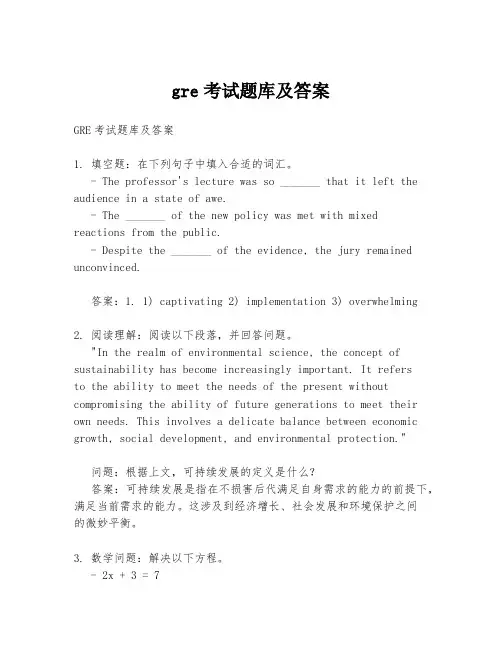
gre考试题库及答案GRE考试题库及答案1. 填空题:在下列句子中填入合适的词汇。
- The professor's lecture was so _______ that it left the audience in a state of awe.- The _______ of the new policy was met with mixedreactions from the public.- Despite the _______ of the evidence, the jury remained unconvinced.答案:1. 1) captivating 2) implementation 3) overwhelming2. 阅读理解:阅读以下段落,并回答问题。
"In the realm of environmental science, the concept of sustainability has become increasingly important. It refersto the ability to meet the needs of the present without compromising the ability of future generations to meet their own needs. This involves a delicate balance between economic growth, social development, and environmental protection."问题:根据上文,可持续发展的定义是什么?答案:可持续发展是指在不损害后代满足自身需求的能力的前提下,满足当前需求的能力。
这涉及到经济增长、社会发展和环境保护之间的微妙平衡。
3. 数学问题:解决以下方程。

你知道GRE和托福考试有哪些区别吗?在报考美国大学的时候,很多学校都会要托福考试成绩和GRE考试成绩。
而且很多刚开始准备考试的考生往往分不清楚托福跟GRE的区别,下面天道小编就为大家介绍一下GRE和托福考试有哪些区别,希望对大家有所帮助。
GRE考试GRE是Graduate Record Examination的缩写,美国研究生入学考试资格考试。
美国大学研究生院规定:申请攻读硕士和博士等高级学位的人员必须参加GRE考试。
GRE考试不仅是美国研究生院选拔培养高级研究人才的重要依据,同时也是各大学研究生院决定是否向申请人提供奖学金资助的重要参考条件之一。
大多数研究生院都要求申请者有GRE成绩,虽然美国各大学看重GRE成绩程度各有差异,但各研究生院入学审评小组往往都把GRE成绩看成一种可靠的参考依据,有的学校采用严格的标准。
美国学校对GRE成绩普通,甚至低于其规定标准的申请者,根本不予考虑录取,有的学校对GRE成绩可稍打折扣。
所以,GRE成绩的高低,意味着申请者是否能被录取。
申请美国稍有名气的大学,或者申请大学的奖学金在很大程度上都看申请者的GRE成绩。
GRE分普通考试(General Test)和专业考试(Subject Test)两种,考生可根据自身的条件和申请学校的要求参加其中一项或两项考试。
普通考试的目的在于:根据大学毕业生的基础知识和能力水平,对考生在高级阶段从事学术研究的一般能力和潜在能力做出衡量,而不涉及任何专业的特殊要求。
专业考试的目的则在于测试考生在学科领域或专业领域中所获得知识和技能以及能力水平的高低。
GRE由美国教育考试服务处(ETS)主办,在我国的承办单位是中国国外考试协调处(CIECB)。
TOEFL考试TOEFL(The Test of English as a Foreign Language,简称TOEFL)是由美国教育测验服务社(ETS)举办的英语能力考试,全名为“检定非英语为母语者的英语能力考试”,中文音译为“托福”。
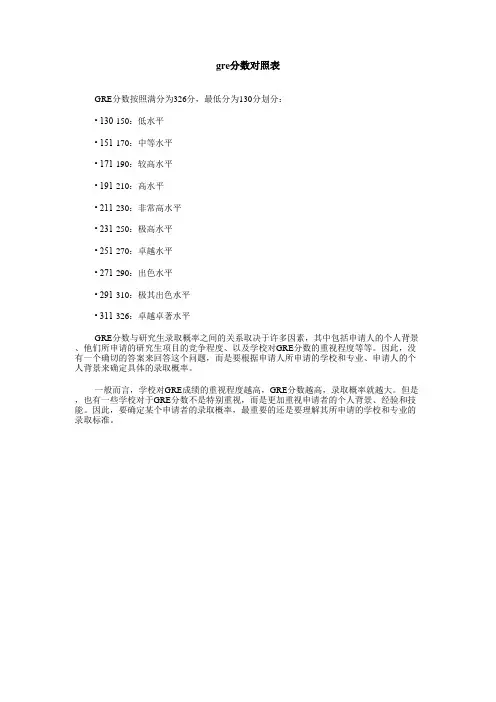
gre分数对照表
GRE分数按照满分为326分,最低分为130分划分:
• 130-150:低水平
• 151-170:中等水平
• 171-190:较高水平
• 191-210:高水平
• 211-230:非常高水平
• 231-250:极高水平
• 251-270:卓越水平
• 271-290:出色水平
• 291-310:极其出色水平
• 311-326:卓越卓著水平
GRE分数与研究生录取概率之间的关系取决于许多因素,其中包括申请人的个人背景、他们所申请的研究生项目的竞争程度、以及学校对GRE分数的重视程度等等。
因此,没有一个确切的答案来回答这个问题,而是要根据申请人所申请的学校和专业、申请人的个人背景来确定具体的录取概率。
一般而言,学校对GRE成绩的重视程度越高,GRE分数越高,录取概率就越大。
但是,也有一些学校对于GRE分数不是特别重视,而是更加重视申请者的个人背景、经验和技能。
因此,要确定某个申请者的录取概率,最重要的还是要理解其所申请的学校和专业的录取标准。
最全GRE算分规则GRE考试的算分规则如下:1. Verbal Reasoning(文字推理):得分范围为130-170,以1分为单位。
这个部分主要测试考生阅读和理解英语文字材料的能力以及推理能力。
2. Quantitative Reasoning(数量推理):得分范围为130-170,以1分为单位。
这个部分主要测试考生数学和逻辑推理的能力,包括基本的数学概念和关系。
3. Analytical Writing(分析写作):得分范围为0-6,以0.5分为单位。
这个部分主要测试考生分析和表达能力,考生需要根据所给的问题或主题撰写一篇文章。
对于Verbal Reasoning和Quantitative Reasoning,考试会给每个部分分别计算一个原始分数和一个百分位数分数。
原始分数代表考生在该部分的得分,百分位数分数表示考生在与其一同参加考试的人群中的表现。
在计算总分时,Verbal Reasoning和Quantitative Reasoning的百分位数分数会加权平均计算出一个总分,并将总分转化为一个0-6的分数。
然后将Analytical Writing的得分加到总分上得出最终的GRE考试分数。
在GRE考试中,考生的分数也会显示一个标准误差(Standard Error of Measurement),该标准误差反映了考生得分的可信度。
标准误差越小,考生的得分越可信。
需要注意的是,GRE考试的分数不代表绝对的知识水平,它主要用来评估考生在相关领域的相对能力。
考生可以通过准备和实践来提高GRE考试得分。
总而言之,GRE考试的算分规则是根据考生在Verbal Reasoning、Quantitative Reasoning和Analytical Writing三个部分的得分计算出来的。
考生需要根据这些规则来了解自己的分数并提升自己的能力。
GRE 是什么?GRE General Test,简称GRE,是全球范围内广泛认可的学术考试。
它是美国大部分研究生院,商学院,法学院等要求申请者必须提供的申请材料之一。
在过去的几十年中,GRE General Test 在全球范围内得到了广泛认可和采用,成为研究生院招生官员评估申请者的重要标准之一。
GRE General Test 主要考察的是学生在各种学科领域的逻辑推理和分析能力,而不仅仅是专业知识本身。
考试内容包括阅读理解、写作、数学和语言推理等几个方面。
阅读理解部分主要测试考生对复杂文本的理解和分析能力;写作部分主要测试考生的论证和写作能力,要求考生就某一话题展开分析和论述;数学部分主要测试考生的基本数学技能和对数量关系的理解;语言推理部分主要测试考生的语言推理和词汇运用能力。
在考试结构上,GRE General Test 由五个部分组成,每个部分都有固定的时间限制。
第一部分是写作,要求考生在30分钟内就给定的话题展开分析和论述;第二部分是阅读理解,考生需要在20分钟内完成一篇长约650字的文章,并回答10道选择题;第部三分是语言推理,考生需要在30分钟内完成35道选择题;第四部分是数学,考生需要在35分钟内完成20道选择题;最后一部分是写作的补充,要求考生在30分钟内就之前的写作进行修正和补充。
在评分方面,GRE General Test 采用的是客观题评分方式,每个部分的得分都会被汇总到总分中。
总分为340分,其中写作部分单独计分,其余四个部分的总分为340分。
此外,考试成绩还分为高分和低分两个等级,一般来说,高于330分的成绩被认为是非常优秀的成绩,而低于320分的成绩则被认为是不理想的成绩。
除了作为研究生院的申请材料之一外,GRE General Test 还是很多专业机构评估申请者的重要标准之一。
例如,很多顶级商学院和法学院等也开始采用 GRE General Test 分数作为申请者的参考指标之一。
GRE专项考试介绍什么是GRE考试?GRE全称为Graduate Record Examinations,是由美国教育测验服务中心(ETS)出题的一项全球性标准化考试,旨在考察考生的英语语言能力和智力水平,在申请美国高校研究生、博士和其他專業學位時需要提交大部分美國大學都要求GRE成绩,是美国下一轮申请勇者的必要门槛。
GRE考试的种类GRE考试有两种,分别为GRE General test(GRE通用考试)和GRE Subject test(GRE专项考试)。
GRE General test是GRE考试的主要考试,包括 verbal reasoning(词汇推理)、quantitative reasoning(数学推理)和 analytical writing(分析写作)三个部分。
该考试的语言所使用的词汇和语法均为美国本土所用语言,所以对于英语非母语的考生来说,这个考试的难度较高。
GRE Subject test则是GRE考试的一个辅助考试,它是专为某些特定领域的研究人员或学生互相之间比较的目的而设立的,这些领域分别为:生物学、化学、文学英语、数学、物理、心理学。
这个考试的难度要大于GRE General test,但它提供的信息更详细、专业,从而可以参考你在某些学科中的潜在能力。
GRE专项考试介绍GRE专项考试是GRE中的一种考试,具体分为以下七种:1.GRE数学专项考试(GRE Mathematics Subject Test)数学考试主要考察考生数学能力的几个方面,包括数学分析、抽象代数、几何及拓扑和应用数学等等。
2.GRE物理专项考试(GRE Physics Subject Test)物理考试主要考察考生的物理理解能力,涉及到近代物理的主要内容,包括力学、电学、热学、量子力学和相对论等。
3.GRE化学专项考试(GRE Chemistry Subject Test)化学考试主要考察考生的化学基础和实验能力,包括元素周期表、无机化学、化学热力学、物理化学和有机化学等等。
简述GRE的概念GRE全称为“研究生入学考试”(Graduate Record Examination),是由美国教育与考试服务机构(Educational Testing Service, ETS)组织并管理的一项标准化考试。
GRE考试主要针对申请攻读硕士、博士及其他研究生课程的考生,用于评估考生的学术能力和潜力,帮助学校选拔合适的研究生招生对象。
GRE考试分为GRE通用考试和GRE学科考试两种。
通用考试主要考察考生的语文(Verbal Reasoning)、数学(Quantitative Reasoning)和写作(Analytical Writing)能力,学科考试则针对具体学科进行考核,如生物学、化学、计算机科学、数学、物理等。
在通用考试中,语文部分主要以阅读理解、文字推理和词汇测试为主要内容。
数学部分主要考察数学推理、数据分析和解决问题的能力。
写作部分要求考生在限定时间内完成两篇作文,一篇是分析论证型的议论文(Analyze an Issue),另一篇是批判分析型的议论文(Analyze an Argument)。
考试形式方面,GRE通用考试采取计算机化考试(CBT)模式,也可选择纸质考试(PBT)模式。
学科考试通常只提供纸质考试模式。
考试内容方面,GRE主要考察考生的基础学科知识、语言能力和解决问题的能力。
语文和数学部分主要考察考生的基础学科知识,而写作部分则是考察考生的表达能力、文思敏捷和逻辑思维能力。
此外,GRE考试还注重考生的解决问题的能力,包括分析问题、提取关键信息、归纳总结、推理判断等。
GRE考试的总分为340分,其中语文和数学部分各占170分。
写作部分从0到6分不等,以0.5分为单位给出成绩。
GRE考试的成绩对于申请攻读研究生学位的考生来说非常重要,它在研究生招生中起着筛选和选拔的作用。
高分的GRE成绩可以提高考生的申请竞争力,增加被研究生院录取的机会。
并且,GRE成绩通常也被用于奖学金和助教职位的评定。
gre分数段对应水平
1. GRE分数段及对应水平
GRE,又称为美国格林伯格考试(Graduate Record Examinations),是
美国教育测验服务中心(ETS)认可的世界范围内最重要的专业准考证,是全球研究生及博士入学考试最常用的标准评估工具之一。
GRE分数
段有助于说明考生的学术能力,它可以帮助大学评估考生是否适合入学,并提供对对学历的参考。
1、GRE考试中的总分一般在130-170分之间,这一点由ETS公布的考
试数据可以得到验证。
2、130-159之间的总分被认为是中等水平,在这一分数段中,两个学
科都要达到150分。
此分数段比较适合适中的大学部分申请者,可以
满足学校的大多数入学要求,但得分较低可能会影响最终录取结果。
3、160-169之间的总分被认为是良好水平,在这一分数段中,实力较
强的大学可以满足录取要求。
此层次的成绩在成功的准入申请中非常
有效,得分较高也会使招生委员会更加认可考生的学术表现。
4、170-190分之间的总分处于优秀水平,并且在申请中,有可能使考
生获得更有竞争力的录取机会。
大学视野越开阔,招生官越有可能向
考生开出更有吸引力的录取要求。
5、190-240之间的总分处于极好水平,它是高分区,考生在GRE考试中达到优秀水平,可满足最高水准院校的入学要求。
此层次的分数段极具竞争力,可以保证考生有更大的机会,进入名牌院校。
虽然考生最终录取结果受多种因素影响,但GRE考试分数段是各种申请录取的重要参考。
因此,考生们应根据自身情况科学备考,提高自己的考试分数,扩大未来的求学空间和深造选择。
gre是什么意思最新解释GRE,全称为“研究生入学考试”(Graduate Record Examination),是由美国教育考试服务中心(ETS)主办的一项标准化考试,旨在评估申请硕士和博士研究生学位的学生的学术能力和准备情况。
本文将解释GRE的含义以及它在学术领域的重要性,进而讨论GRE的考试内容、考试形式和备考建议。
一、GRE的含义及在学术领域的重要性GRE(Graduate Record Examination)是国际间广泛接受的研究生入学考试。
GRE成绩是世界上许多高等教育机构和研究生项目的重要申请指标之一。
该考试的目标是评估学生在数学、写作和阅读理解等方面的学术能力。
GRE的重要性主要体现在以下几个方面:1. 研究生申请:GRE成绩是申请研究生学位的必备材料之一,许多大学和研究生项目要求申请者提供GRE成绩作为评估学生学术能力的依据。
2. 学术能力评估:GRE通过对学生的数学、写作和阅读理解能力的全面考察,帮助学术机构评估学生的学术能力和适应能力,以确保他们能够顺利完成研究生学业。
3. 相对公平的评估标准:由于GRE是标准化考试,采用相同的考试内容和评分标准,因此可确保不同申请者之间的公平性和可比性。
二、GRE的考试内容GRE主要包括三个部分:定量推理、语文和写作。
下面将对每个部分的考试内容进行介绍。
1. 定量推理(Quantitative Reasoning):此部分考察考生在基本数学概念、代数、几何、数据分析等方面的能力。
题型包括选择题、填空题和数据解释题。
2. 语文(Verbal Reasoning):此部分考察考生的阅读理解和词汇量。
题型包括句子填空、阅读理解和文本完成等。
3. 写作(Analytical Writing):此部分考察考生的写作能力和分析思维能力。
要求考生分析给定的话题,并撰写一篇有逻辑、有条理、有文采的文章。
三、GRE的考试形式GRE考试可分为计算机版和纸质版两种形式。
GRE寫作 1 GRE寫作補充講義
一、 人物 Michelangelo 米開朗琪羅 Euclid 歐機裡德 Archimedes 阿基米德 Aristotle Galileo Kepler Copernicus Bruno Ptolemy Isaac Newton Columbus Thomas Edison
Einstein(Zurich 蘇黎世)
Marie curie(Pierre) Radioactivity is the starting point for cancer treatment, for the dating techniques used on ancient objects, rocks and the universe, and for molecular biology and modern genetics; it is also the source of nuclear energy and the atomic bomb.
Frank Borman In 1970, Apollo astronaut Frank Borman embarked on a 12-nation fact-finding mission to determine the fate of American servicemen missing in Vietnam. Though his search proved fruitless, he told Congress, "I beg you not to forsake your countrymen who have given so much for you."
Stephen hawking(A Brief History of Time ;suffer from ALS)
Descartes 笛卡爾 Kant--kantianism康得 Hegelian--Hegelianism Schopenhauer 叔本華(German philosopher) GRE寫作 2 Socrates Plato
以下選自英國文學史: Geoffrey Chaucer William Shakespeare----Hamlet,Sonnet, Francis Bacon------Of Truth, Of Studies, John Milton------Paradise Lst John Bunyan-----The Pilgrim's Progress Daniel Defoe-----Robinson Crusoe Jonathan Swift----Gulliver's Travels Robert Burns----A Red, Red Rose William Wordsworth George Gordon, Lord Byron Shelley John Keats Walter Scott Jane Austen---- Pride and Prejudice Charles Dickens Charlotte Bronte----Jane Eyre Emily Bronte----Wuthering Heights Thamos Hardy Bernard Shaw Lawrence-----Sons and Lovers
以下選自美國文學史: Benjamin Franklin Thomas Jefferson--- The Declaration of Independence Washington Irving ----The Legend of Sleepy Hollow Emerson Henry David Thoreau Henry Wadsworth Longman Walt Whitman Emily Dickson Harriet Beecher Stowe Mark Twain---- The adventures of Tom Sawyer O Henry--- The Cop and the Anthem Henry James-----The Portrait of a Lady Jack London---- The Sea Wolf, Martin Eden Ernest Heminway ----- A Farewell to Arms John Steinbeck ------ The Grapes of Wrath GRE寫作 3 Leonardo da Vinci Bach 巴赫 Beethoven Mozart Time-Warner Rolling Stones Rock-and-Roll Beetles Dali Picasso Andy Warhol Rodin's "The Thinker"
George Bush On January 16, 1991, President Bush ordered the commencement of Operation Desert Storm, a massive U.S.-led military offensive against Iraq in the Persian Gulf. In late 1992, Bush ordered U.S. troops into Somalia, a nation devastated by drought and civil war. The peacekeeping mission would prove the most disastrous since Lebanon, and President Clinton abruptly called it off in 1993.
Jimmy Carter President Carter's policy of placing human rights records at the forefront of America's relationships with other nations contributed to a cooling of Cold War relations in the late 1970s. In 1980, for the first time in seven years, Fidel Castro authorized emigration out of Cuba by the country's citizens. The United States welcomed the Cubans, but later took steps to slow the tide when evidence suggested that Castro was using the refugee flight to empty his prisons.
Neville Chamberlain In 1938, British Prime Minister Chamberlain signed the Munich Pact with Adolf Hitler, an agreement that gave Czechoslovakia away to Nazi conquest while bringing, as Chamberlain promised, "peace in our time." Eleven months after the signing of the Munich Pact, Germany broke the peace in Europe by invading Poland. A solemn Chamberlain had no choice but to declare war, and World War II began in Europe.
Winston Churchill In the early 1930s, Conservative M.P. Winston Churchill issued unheeded warnings of the threat of Nazi aggression from his seat on a House of Commons backbench. GRE寫作 4 With German tanks racing across France, Churchill spoke to the British people for the first time as prime minister, and pledged a struggle to the last breath against Nazi conquest and oppression. In the summer of 1940, the democracies of continental Europe fell to Germany one by one, leaving Great Britain alone in its resistance to Adolf Hitler. The Nazi leader was confident that victory against Britain would come soon, but Churchill prophesied otherwise, telling his countrymen that the Battle of Britain would be "their finest hour."
Bill Clinton In 1994, President Clinton authorized a military operation to overthrow Haiti's military dictators and restore its democratically elected leader. On the eve of invasion, bloodshed was prevented when former president Jimmy Carter brokered an agreement with Haiti's leaders in which they pledged to give up power.